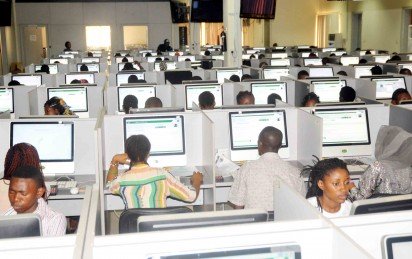Education in Nigeria
JAMB, WAEC season of bungled exams traumatize thousands of candidates

The Joint Admissions and Matriculation Board ( JAMB) and the West Africa Examinations Council (WAEC) have come under intense fire and pressure in recent times on account of what many describe as poor outings in the conduct of their examinations, more especially, for their shoddy conduct of the 2025 examinations.
Stakeholders in the education sector have continued to berated WAEC for its unsavoury superintendence of the 2025 Senior School Certificate Examination, which led to technical glitches in the recently released West African Senior School Certificate Examination (WASSCE) results.
Earlier in the year, it was the turn of JAMB, which had to cancel and rescheduled it’s examination after a national outrage over technical issues that affected the entire Southeast, and parts of Lagos, leading to mass failures.
JAMB had claimed the problem had to do its adoption of a new software for the CBT (Computer Based Test), while WAEC blamed its own fault on adoption of the CBT mode of examination to reduced incidence of malpractices, and exam linkages.
The minister of Education, Dr. Alausa, had boasted about the resort to CBT by WAEC as the greatest move by his ministry to curb exam fraud, and improved trust and confidence in Nigerian exams and certificates.
In separate interviews with Business Hallmark, the aggrieved stakeholders – parents, students, and education experts called for independent investigations into the matter, and the imperative need to immediately overhaul the council’s management.
General Disappointment
They noted that a situation where the examination, a standardized evaluation for secondary school leavers, and a major requirement for tertiary institution admissions, is subjected to trial and error is not only unacceptable but abusive of the sanctity of the examination.
According to them, the inconsistencies in such high-stakes examinations have the potential to further rubbish the credibility of Nigeria’s academic qualifications, both locally and internationally.
Recall that the examination body had, on August 4, released the West African Senior Secondary Certificate Examination (WASSCE) results, saying only 38.32 per cent of its 1,969,313 candidates secured credits in five subjects, including English Language and Mathematics.
The poor results drew umbrage of stakeholders, with parents and civil society organisations calling for the cancellation of some of the papers, especially English Language and Mathematics.
In a twist forty-eight hours after the results were released, WAEC stated that there were technical glitches during an internal review and temporarily blocked access to the results.
At a subsequent press conference held a week after, WAEC said after reviewing the process, the new statistics indicated that a total of 1,239,884 of the 1,969,313 candidates, representing 62.96 per cent, now have five credits, including English and Mathematics.
The Council blamed the technical glitches on ‘serialization issues’ in some subjects, including Mathematics, English, Biology, and Economics. The development, however, ignited a storm of reactions from stakeholders, who called in question the integrity of Nigeria’s education assessment system.
The Founder of the Education for All Initiative (EFAI), James Odion, accused the examination body of bastardizing the entire education process.
“You cannot make such a serious examination a subject of trial and error. Today, the pass rate is 38 per cent, tomorrow it becomes 63 per cent. How are we supposed to trust the authenticity of these results?” he queried. Odion urged the Federal Ministry of Education, the Presidency, and the National Assembly to begin an urgent investigation into the matter.
The Nigerian Factor
“All the ups and downs with results, is it just in Nigeria, or is it happening in Ghana, in Sierra Leone, in Gambia, all those West African countries?
“And, if it is happening only in Nigeria, then the Federal Ministry of Education has to tell the country what exactly is going on,” he said.
A parent, Mr. A. Samson, a teacher at Ruthwiphdale Schools, made a case for a thorough analysis to ensure the results truly reflect improved learning outcomes and not just deliberate adjustments.
Another parent, George Otobo, attributed the development to poor funding of the sector. He stated that if the country could do well in its education budget, all examination bodies would conduct credible examinations for candidates. According to him, adequate education budget would stem malpractice and give examination bodies the resources to provide infrastructure that would enhance their job.
Engineer Samuel Emmanuel, proprietor of Blue oak International School, Ijegun, stated that the back and forth by WAEC in the release of the results has made the council lose its credibility. He said the public outcry and pressure on the examination body after the earlier released results compelled the review of the results, which could not be trusted.
” I can’t trust the reviewed results. It was a reaction to pressure. We need to overhaul these examination bodies, including JAMB, which also performed below par.
Some have, however, praised the WAEC after it proactively resolved the technical glitches on its results portal.
They are of the view that the timely intervention by the Council within the shortest possible time, coupled with proactive information dissemination during the challenging moment, was impressive.
The consensus of those, who hold that the examination body did well is that it’s timely interventions through a review validated the exams body’s capability in efficient and effective digital interactions that ramify WAEC’s operations, and the credibility and integrity of its examination processes.
At a press conference by the council on Friday, August 8, by its Head of National office, Dr. Amos Dangut, it announced the release of fresh and revised results of candidates, who sat the 2025 May/June examination, calling them the “authentic results of candidates”.
The council further added that candidates could now apply for their digital certificate, which would be released forty-eight hours after the Friday briefing.
WAEC’s image maker, Moyosola Adesina, had earlier on Wednesday, August 6 informed the mainstream and online media about the technical downtime through the Council’s official social media platforms.
Toyin Damilare, an SS2 student told Business Hallmark that “WAEC should be punished for the glitches fiasco , it shows lack of due diligence.
Two of a Kind
Similarly, the 2025UTME test was also marred by glitches, a development that is not only disturbing, but has called in question the sanctity of our examinations. Though, subsequent test was also rescheduled for candidates affected by the glitches in some states, the damage had been done.
Amid the backlash and calls for his sack for bungling the examination, JAMB Registrar, Prof. Oloyede apologized to Nigerians, and even shed a few public tears. To his credit, Prof. Oloyede has transformed JAMB from a poorly managed, inefficient, and corruption-ridden body to very remarkable, revenue yielding, and effective agency to be trusted. But the mishap of 2025 fatally damaged his sterling reputation, especially because of its political and ethnic Undertones.
While shedding tears, he admitted that some errors affected the outcome of the examination.
However, beneath the apology and plan to have the affected candidates resit for the examination, which they later did, stakeholders offer a way forward to avoid such mass failure in the future.
Earlier, thousands of candidates, who sat the 2025 UTME had earlier said they will file a lawsuit against the examination board following widespread complaints of technical glitches, and incomplete questions that allegedly marred the exam.
Popular education advocate and Chief Executive Officer of Educare, Alex Onyia, had threatened that legal proceedings would commence at the Federal High Court against JAMB.
Onyia disclosed then, that over 8,000 affected students had formally complained about the exam’s technical issues and were demanding that JAMB release detailed score sheets for verification.
More Than a Coincidence
“Currently, we have 8,391 students, who have sent in their complaints regarding the glitches in the JAMB 2025 exam,” Onyia posted on his X page, @winexv. “There is ample evidence to prove that JAMB’s system was inefficient, thereby causing serious harm to these students’ mental health.”
The massive failure in 2025 UTME has attracted mixed reactions from Nigerians. While some have apportioned blame to the government, others believed that students and parents should be held responsible.
Similarly, some parents and candidates have vehemently rejected the results as a true reflection of what transpired during the just-concluded examination, with some of the candidates taking to social media to express their displeasure and express worries over the results.
Speaking to Business Hallmark Prof. David Fiki, an expert in French Literature, noted that the poor performance is an indictment against successive Nigerian governments for not attending to critical issues bothering on education.
He stated that no government at any level in the country has taken education seriously. “Well, the Nigerian government in recent years has done the least to attend to critical issues bothering on education, especially at all of the basic levels.
“You can see that with how they pay lip service to budgetary allocations to the sector and the deplorable state of most of our schools.
“No government at any level has taken education seriously. I can’t list all the issues, but the facts are out there.”
In his reaction, former presidential candidate of the Labour Party, Peter Obi, decried the state of Nigeria’s education system.
In a statement posted on X , Obi described the outcome as “a reflection of the deep-rooted challenges in our educational system,” citing the Joint Admissions and Matriculation Board’s official figures, but the admission of JAMB proved him wrong.









Olubunmi
August 18, 2025 at 12:18 pm
When can I upload waec 2025 results on jamb porya.